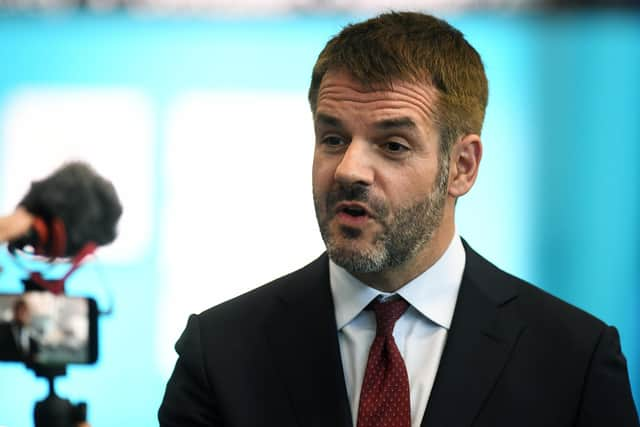The current model for running bus services in Yorkshire isn’t working - Andrew Vine
I’d bet that every one of us at the stop who owns a car wished that we’d used it instead of taking the bus.
There must be identical scenes all over Yorkshire every day of the week.
Advertisement
Hide AdAdvertisement
Hide AdThis week, the people of South Yorkshire are being invited to express their frustration and demand a better service for passengers when a series of public meetings organised by the area’s mayor, Oliver Coppard, gets under way.


They have every justification for being furious, and Mr Coppard is right to mobilise public opinion against a Government funding system for buses that was last year exposed as a lottery in which South Yorkshire lost out.
It is preposterous that an area the size of Mr Coppard’s should have substandard services, especially in Sheffield, one of the biggest cities in the country, where residents have long complained about a lack of buses.
It says much about the dire state of services across our county that the complaints of a major city should these days echo those of the rural areas of North and East Yorkshire, which have long felt abandoned by public transport.
Advertisement
Hide AdAdvertisement
Hide AdBut then increasing numbers of people are finding themselves in that position. Only days before Mr Coppard urged the public to join him in pressing for a better deal, the Traffic Commissioners for Great Britain, which licence services, revealed that the number of them had fallen by 20 per cent over the past year, with 2,160 routes lost.
The current model for running services isn’t working. Operators are cutting them because the sums don’t add up, and every council in Yorkshire must have been faced with the choice between trying to plug funding gaps or seeing services lost, especially in the evenings.
The stated aim of our region’s elected mayors to take buses back into public control is likely to attract widespread support because it will tailor services to the demands of passengers.
The shortcomings of privatising the railways have become all too apparent in recent years – especially in Yorkshire, where we’ve had to endure some truly dreadful services – but it has long been clear that the attempt to do likewise with buses has been no more successful.
Advertisement
Hide AdAdvertisement
Hide AdIt was in 1985 that Margaret Thatcher’s government gave operators the final say over what services to run and how much to charge.
As with the railways, lower fares and better services were promised, but that hasn’t happened. Instead, there has been long-term decline, and a generation has grown up since privatisation which turned away from buses because they are too infrequent, too unreliable or too costly.
Even the Government’s laudable capping of fares at £2 – rising to £2.50 next year – has demonstrated its peculiar knack for taking one step forward and then two back.
There is absolutely no point in the Government making fares affordable while at the same time presiding over a system that allows services to be lost. That makes even less sense in an era when people keen to play their part in tackling climate change would be all too willing to leave their cars at home.
Advertisement
Hide AdAdvertisement
Hide AdDecent services are an economic and social necessity. They are regarded as such in London, where the capital would grind to a halt without efficient and frequent buses, and that same attitude needs to be adopted in the rest of the country.
The truth of this is to be seen everywhere in Yorkshire, but particularly in the rural areas, where the scarcity of services is one of the central factors in the declining fortunes of so many market towns and villages.
Many of these communities have an ageing population amongst which car use is falling – possibly because the cost of running a vehicle has become prohibitive, or in some cases because people have ceased to drive for health reasons.
How are they supposed to get to the shops, or medical appointments or to see friends and family?
Advertisement
Hide AdAdvertisement
Hide AdA lack of buses is a factor in social isolation and the epidemic of loneliness that blights so many older peoples’ lives and undermines their health.
There needs to be a fundamental national rethink of the role buses play in serving the public. Protests about the terrible state of the railways in Yorkshire forced the Government to act. It’s now time to make our voices heard about the buses and demand the services we deserve.